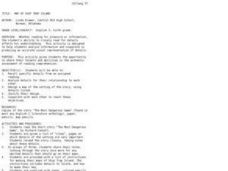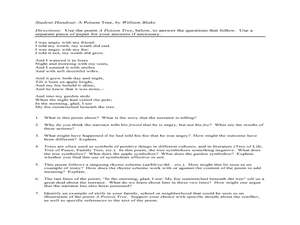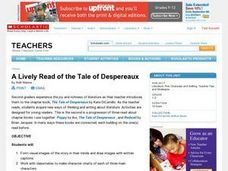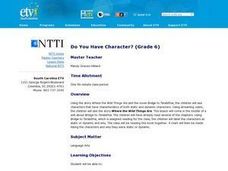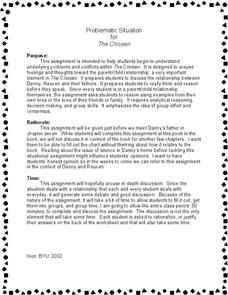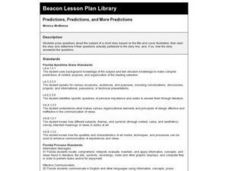Read Works
Climax of a Story
Demonstrate how to track the elements of plot in a story. After watching you mark down the rising action, problem, climax, falling action, and resolution for Stone Soup by Jon J. Muth, pupils complete a graphic organizer for Sweet Clara...
Curated OER
Plot Development
Students identify the elements of plot and write a script with a strong plot. In this plot lesson, students identify elements of plot in examples by completing a chart and a graphic organizer. Students then create plots from given...
Curated OER
Laurence Yep's, Dragonwings
Students discuss vocabulary words and compare definitions. They read chapters 6-9 of the novel, Dragonwings, and discuss point of view, and complete a plot diagram. Then they review the four types of conflict and identify the conflicts...
Curated OER
Map of Ship Trap Island
Students read the short story "The Most Dangerous Game," and create maps of Ship Trap Island and justify why items are placed on their map in certain locations.
Curated OER
"Tree of Peace": Critical Thinking About Revolution to Global Conflict
Tenth graders explore the importance of peace in society. In this Global History lesson, 10th graders create a common vocabulary for the different elements that exist in a peaceful society. Students discover the connections between...
Curated OER
Battling Bullies
Students identify aspects of a conflict situation through a story. They engage in problem solving or identification of an aspect of bullying. Applying their knowledge of bullying, they create scenarios that reflect their methods of...
Curated OER
Lively Read of the Tale of Despereaux
Students create a character map of the main characters in The Tale of Despereaux. After reading the text, students create a character chart based on information they gleaned from the story. They use this information to write a letter...
Alpena-Montmorency-Alcona Educational Service District
4th Grade Personal Narrative
Throughout 10 lessons, fourth graders learn how to plan, organize, write, and edit their own personal narratives. In the beginning, young writers come up with ideas of personal experiences and the emotions linked with those experiences....
Curated OER
The Princess and the Pea
Students participate in various shared reading and writing activities related to the classic fairytale "The Princess and the Pea." They identify the story elements, write an opening sentence for the beginning of the story, and discuss...
Arts Ed Washington
Art Lessons in the Classroom: Our Family
Blend art and family into one instructional activity with an activity involving oil pastels and watercolors. After viewing a few famous portraits of families, learners create masterpieces that represent their own families.
Curated OER
Cause and Effect with "Cloudy With a Chance of Meatballs"
Fourth graders explore reasoning by reading a book with their classmates. In this cause and effect lesson, 4th graders read the children's story Cloudy with a Chance of Meatballs and discuss the story elements, characters and plot....
Curated OER
Arthur Meets the President
Young scholars discuss the role of the President. In this government lesson, students read Arthur Meets the President and complete a story map. Young scholars develop new vocabulary related to the story.
Curated OER
Rachel's Life is in a Hole
Explore how lack of access to water impacts peoples' lives in poor countries. Through text reading and discussion, middle schoolers are presented with the story of a young girl who lives and functions with limited water resources. They...
Curated OER
Reporting Live from the Twentieth Century
Students create a news story on one of the top 100 news stories of the 20th century.choose one past news event. They write a news story about that event, and provide a continuation of the story based on their research.
Curated OER
Do You Have Character?
Sixth graders read Katherine Paterson's novel, Bridge to Terabithia, and watch a video of Maurice Sendak's book, Where the Wild Things Are. They examine the characters in both stories that share similar characteristics. Students use the...
Urban Education Exchange
Lessons and Units: The Watsons go to Birmingham—1963 5TH GRADE UNIT
Get ready to read The Watsons Go to Birmingham - 1963 with a lesson about historical fiction. Spanning several centuries, the resource prompts learners to guess the historical era of a story based on a word or phrase in the text. In...
Curated OER
The Chosen: Problematic Situation
"What my father had anticipated was now actually happening." The Chosen explores the complicated relationships between parents and their children. Readers make personal connections to Chiam Potok's story, set in Brooklyn's Hasidic...
Sundance
Teaching Strategies: The Giver
Can utopia be achieved? Included here are three literature worksheets to pair with Lois Lowry's The Giver. Pupils work in groups to come up with solutions to society's issues, individuals back up a statement related to a topic in the...
Curated OER
Comprehension: Setting
Students discuss what setting represents. In this language arts lesson, students review the three elements of setting: where the story takes place, when does the story take place, and is it past, present, or future? Students create a...
Curated OER
Upside-Down Books
Students read various examples of literature. In groups, they brainstorm a list of views that go against what was in one of the stories. They illustrate the opposite ideas and compile them into a class book. They use each other to...
Curated OER
Predictions, Predictions, and More Predictions
Third graders pose questions about the subject of a short story based on the title and cover illustration; then read the story and determine if their questions actually pertained to the story line, and, if so, how the story answered the...
Curated OER
Write Your Own Folk or Fairy Tale
Pupils analyze folk and fairy tales. In this language arts lesson plan, students discuss the elements of a tale determining what the differences are between folk and fairy tales. Pupils then write their own tales using the graphic...
Curated OER
Major and Minor Characters
In this reading worksheet, students complete a chart about two characters from a book. Information includes the character names, how they look, how they act, how they interact with others, and how the student might relate to them.
Curated OER
Narrative Literature Response Letters: Original Lesson Plan
Readers write a formal letter to an author offering an alternative ending to a story the author has written. First, the class reads a story or novel. Upon finishing the reading, they are introduced to the format of a formal letter. They...





